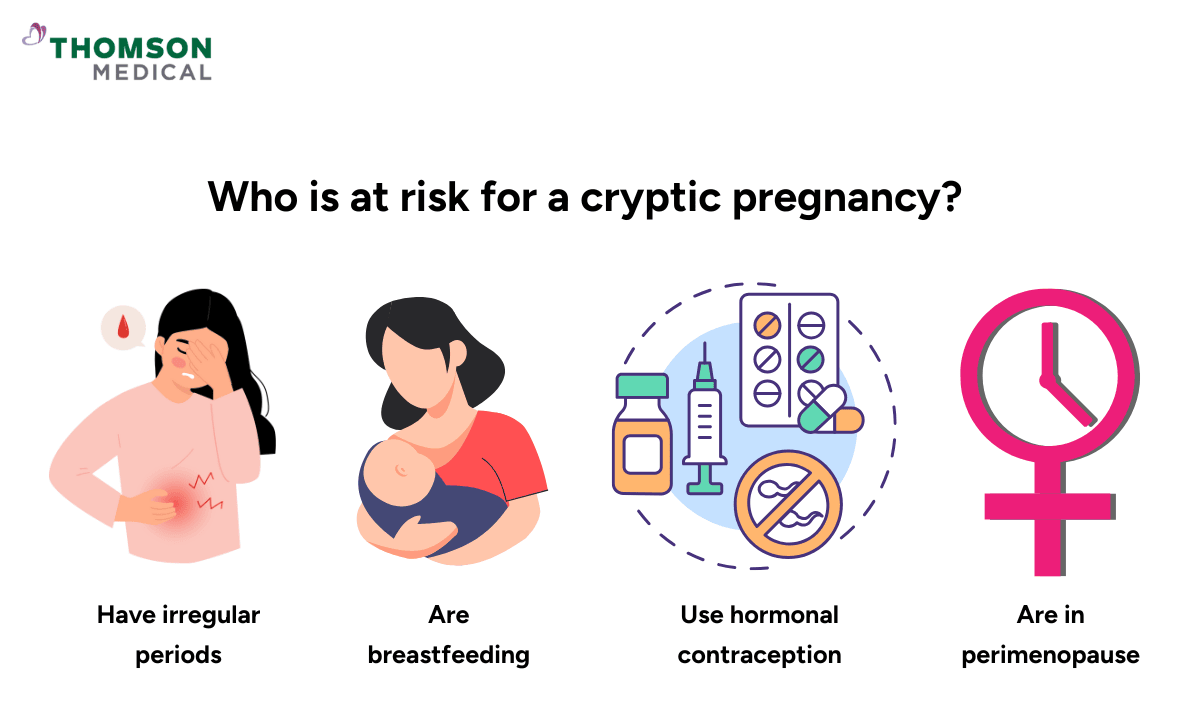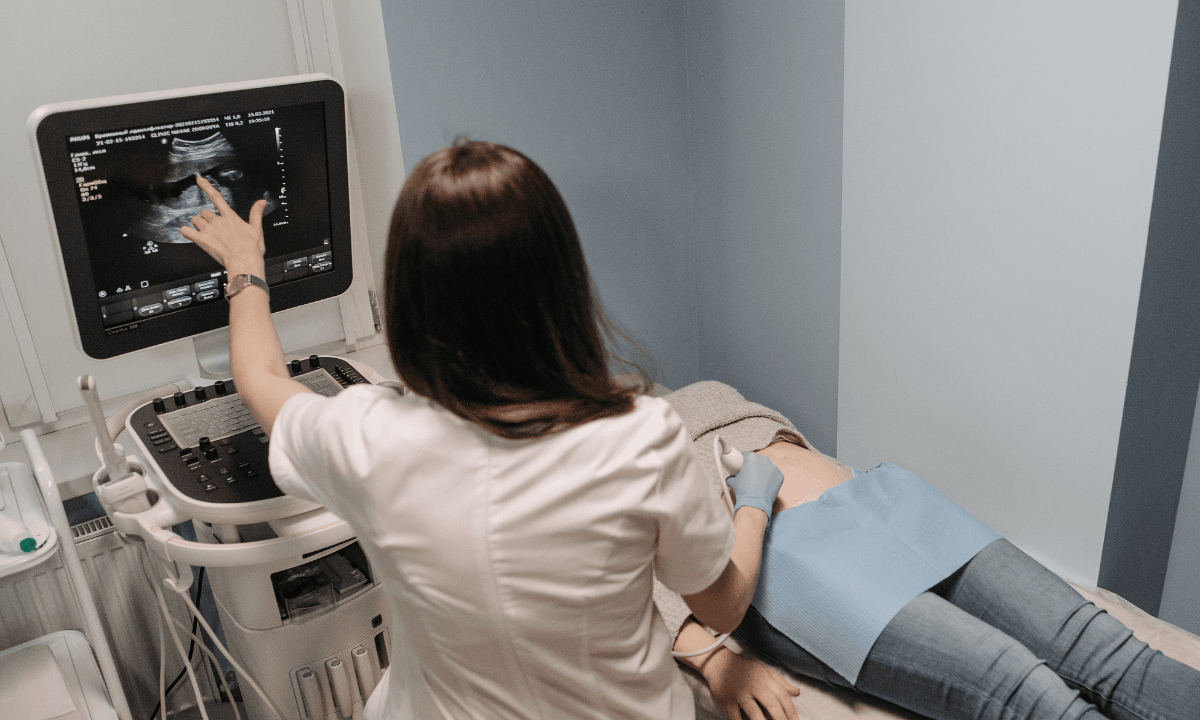Pregnancy is usually a noticeable and life-changing experience, with clear symptoms and milestones. But sometimes, it’s possible for women to not realise that they're pregnant until they're very late in pregnancy, or even until they start having contractions.
This uncommon situation can lead to unique challenges, both physically and emotionally, especially due to delayed antenatal care. However, by understanding the signs and risks, as well as the steps to take if you suspect you might be experiencing this condition, you can help to protect your health and your baby's well-being.
What is a cryptic pregnancy?
A cryptic pregnancy is also called a stealth or denied pregnancy. It happens when a person does not realise they are pregnant until halfway through the pregnancy. In rare cases, they find out only at labour or delivery. This condition happens in about 1 in every 400 to 500 pregnancies when found around 20 weeks, and about 1 in every 2,500 pregnancies is only identified at the time of childbirth.
Symptoms of a cryptic pregnancy
The signs of a cryptic pregnancy are often subtle, easy to miss, or confused with other conditions. You may notice:
Light spotting or irregular bleeding that you could mistake for a period
Little or no visible baby bump, which can depend on your body shape or where your placenta is positioned
A negative result on a home pregnancy test if your hCG (human chorionic gonadotropin) levels are low or rise later than usual
Few or no common pregnancy symptoms, such as breast tenderness, nausea, fatigue, or noticing your baby’s movements
How long can a cryptic pregnancy last?
A stealth pregnancy can stay undetected until around the mid-second trimester (about 20 weeks). Sometimes, a person doesn't know they're pregnant for the whole 40 weeks, and they only find out when they go to the emergency room in labour.
Who is at risk for a cryptic pregnancy?

You are more likely to experience a cryptic pregnancy if you:
Have irregular periods, such as with polycystic ovary syndrome (PCOS), which can make it hard to notice changes in your menstrual cycle.
Are breastfeeding or have recently given birth and assume that ovulation and pregnancy aren’t possible during this time.
Use hormonal contraception and believe that pregnancy cannot occur while on birth control.
Are in perimenopause or approaching menopause and dismiss pregnancy symptoms as hormonal changes related to ageing.
Have never been pregnant before, have obesity that can mask physical signs, or are dealing with psychological stress, denial, or certain mental health conditions that might lead you to overlook pregnancy signs.
Have a history of infertility, miscarriage, or limited healthcare access, which may delay recognition or medical confirmation
Being aware of these risk factors can help you better understand your body and recognise any unusual signs early. If you suspect that you might be pregnant despite these challenges, taking a pregnancy test or consulting your healthcare provider is important.
For more personalised information about the cryptic pregnancy and to discuss your individual circumstances, consider consulting a gynaecologist. You can contact Thomson Medical to arrange a consultation and receive guidance tailored to your needs.
Our pregnancy specialists
Loading...
What causes a cryptic pregnancy?
There are a few possible reasons for a cryptic pregnancy.
The hormone hCG is sometimes not found in high enough levels, or its levels are rising slowly. This makes it harder to detect pregnancy, and the symptoms are less noticeable.
Hormonal imbalances caused by PCOS or thyroid disorders can make the common pregnancy signs less noticeable.
Psychological denial or unconscious unawareness of being pregnant.
Physical factors like the position of the placenta at the front of the uterus or the shape of your uterus, which can hide sensations of the baby’s movements and prevent visible baby bump growth.
What are the risks and complications of a cryptic pregnancy?
If your pregnancy is not detected, you will not be given the necessary prenatal care, and so you may undergo the following problems:
Preterm birth, low birth weight, and other complications affecting your baby’s health around the time of delivery.
Undiagnosed maternal health issues like high blood pressure or diabetes can have a significant impact on both you and your baby.
Emotional and psychological distress due to the surprise and uncertainty of a late pregnancy discovery.
You may have consumed alcohol or tobacco or taken any unsafe medications before you realised you were pregnant, and it may affect the development of your foetus.
How is a cryptic pregnancy diagnosed?

A cryptic pregnancy is diagnosed using the same methods as a typical pregnancy. Your healthcare provider may:
Do a blood test to check for the pregnancy hormone (hCG)
Perform a transvaginal ultrasound to detect the presence of the foetus.
Carry out a physical exam, including measuring your womb (fundal height)
Once pregnancy is confirmed, your provider will recommend starting prenatal care right away.
What should you do if you think you might have one?
If you suspect you may be pregnant, even without clear symptoms, you should:
See a healthcare provider promptly for an evaluation
Ask for both a blood hCG test and an ultrasound to confirm pregnancy
Begin prenatal care immediately, including nutritional guidance, supplements, and regular monitoring
Seek emotional support or counselling, as learning about a cryptic pregnancy can feel overwhelming.
FAQ
Do you still get your period during a stealth pregnancy?
You won’t have a true menstrual period, but light spotting or implantation bleeding can occur and may be mistaken for a regular period.
Can you prevent a cryptic pregnancy?
You can lower the chances by tracking your menstrual cycles. Use contraception consistently if you do not want to conceive. Seek medical testing if you have missed periods or notice unusual symptoms. Do this even if home urine tests for pregnancy are negative.
Can cryptic pregnancies be delivered?
Yes, healthy deliveries are possible. However, because prenatal care often starts late in cryptic pregnancies, there are increased health risks. After a positive pregnancy test, your healthcare provider will guide you through the appropriate medical care and monitoring.
Can you be 3 months pregnant and still test negative?
Yes. If your hCG levels are low or increase slowly, home pregnancy tests may show a false negative. Medical blood tests and ultrasounds are more reliable in detecting pregnancy in such cases.
Can a woman get pregnant without sperm entering her body?
No. Pregnancy occurs only when sperm fertilises an egg inside the reproductive system. Sperm must enter the body for pregnancy to happen.
How can you be pregnant and not know?
Cryptic pregnancy can happen when symptoms are few or mistaken for other conditions. Psychological factors like denial can also stop people from realising they are pregnant. Low hormone levels, irregular periods, and some physical factors can hide typical pregnancy signs.
The information provided is intended for general guidance only and should not be considered medical advice. For personalised recommendations and tailored advice, please consult a specialist at Thomson Medical. Request an appointment with Thomson Medical today.
For more information, contact us:
Thomson Specialists (Women's Health)
Thomson Women's Clinic (TWC)
- Novena:
6592 6686 (Call), 8611 8986 (WA) - Bukit Batok:
6569 0668 (Call), 8686 3525 (WA) - Choa Chu Kang:
6893 1227 (Call), 8282 1796 (WA) Jurong:
6262 8588 (Call), 6262 8588 (WA)- Katong (female doctor):
6970 2272 (Call), 8611 9020 (WA) - Punggol:
6243 6843 (Call), 8811 0328 (WA) - Sembawang: 6753 5228
- Sengkang: 6388 8125
- Serangoon (female doctor): 6382 3313
- Tampines: 6857 6266
- Tiong Bahru: 6276 1525
